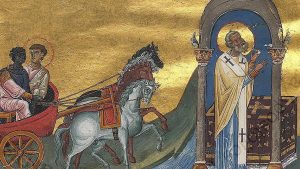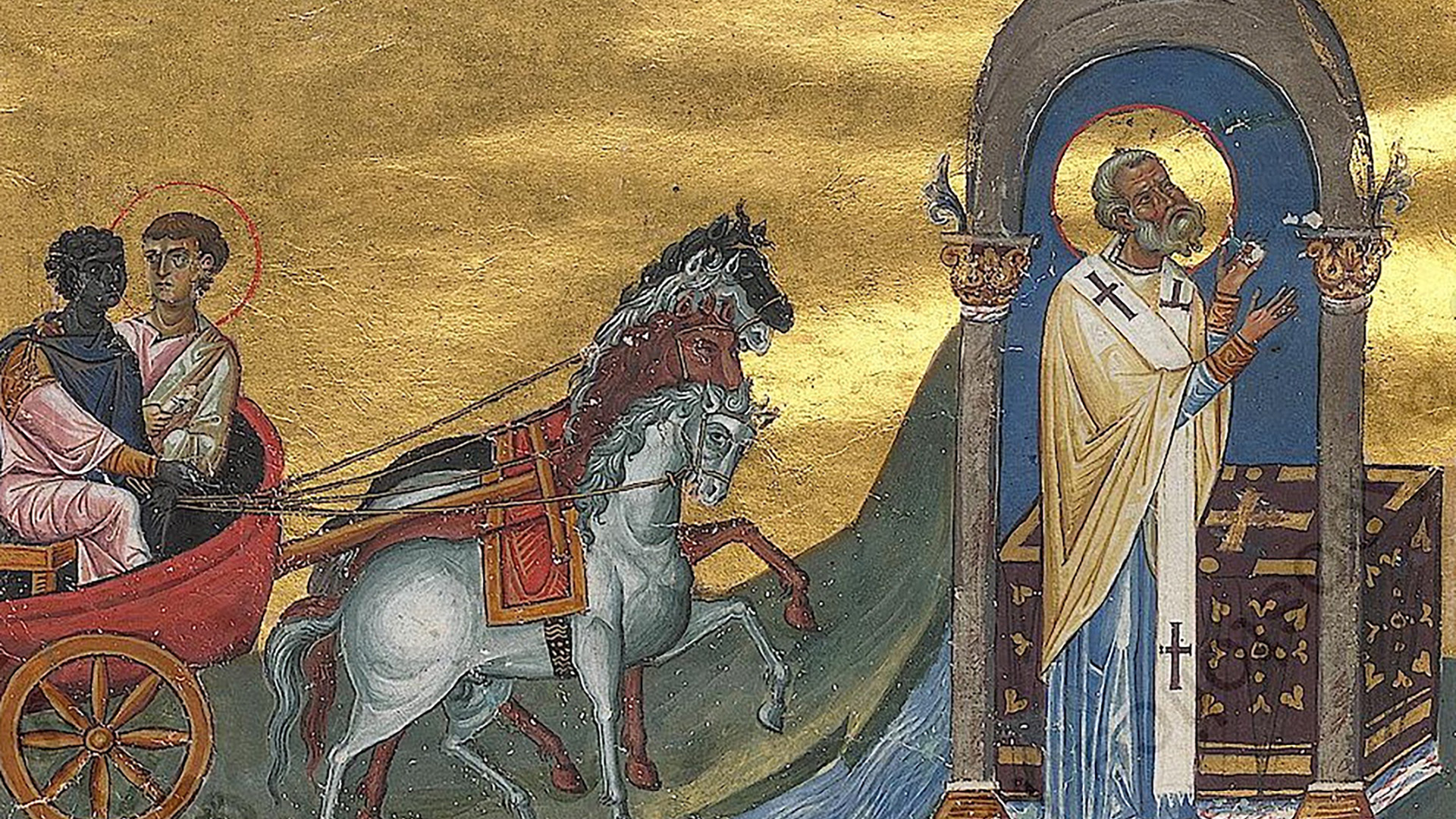Ethiopian Eunuch: Margins of Miraculous
a guest blog by Shawn Blythe.
The Bible is full of characters who have clear guidance from God and an explicit mission to fulfill. Moses had his burning bush, Samuel had his vision in the temple, Mary had her heavenly visitors, and Paul had his conversion experience on the road to Damascus. But most of his will pass through our lives with less direct clarity from God. If, like me, that is your situation, then you will likely identify with the Ethiopian Eunuch in Acts 8.
This man had traveled from his homeland (likely in Southern Egypt or modern-day Sudan) to Jerusalem to worship and was now on his journey home. This was not a trip to the corner market and would have likely taken several weeks in each direction and involved both land and sea travel. Although he was obviously a man of importance in his home country, he made it a priority to take the journey to Jerusalem to worship. Despite this dedication, he is perplexed by the scriptures and struggles to figure out exactly who the prophet is talking about in Isaiah 53.
Many of us can likely stop right here and identify completely with him. How many times have we read a passage and struggled to figure out who exactly is being referenced? Who were the three shepherds Zechariah got rid of in one month? (Zechariah 11) John the Baptist’s followers had to ask Jesus if he was the Messiah or if they should be waiting for somebody else. Even Jesus’ disciples repeatedly had to ask him to clarify his parables. We live in a world where we know only “in part” and our view of the world is as though we are looking at a poor reflection (I Corinthians 13). There is a lot of distortion and clarity is often missing.
Our friend was likely a Jewish convert to Judaism rather than a Jew himself. We don’t know if this was his first trip to Jerusalem or whether perhaps, he had made this pilgrimage before. But in either case, he was diligent in his efforts to worship at Jerusalem and to read the scriptures even if he didn’t fully understand them. I am particularly impressed by the fact that he is reading the scripture on his way home. As with any journey there is a certain level of excitement and anticipation on the way to a destination but typically less on a journey back home from the destination. Our thoughts and priorities begin to shift to the future. When will we arrive home? What needs to be done when we arrive? I wonder what happened while I was away. I almost get the feeling that the Isaiah scroll was picked up in Jerusalem while he was there, and now he was studying his newly acquired document on the return journey. But regardless of the timing of the scroll’s acquisition, this trip was not a ‘check the box’ exercise. He was diligently reading scripture in the hope that it would be understandable to him.
As the Ethiopian Eunuch struggled with this passage, I can imagine that he faced two challenges. The first was his dedication to obedience in the face of uncertainty. The second was balancing his role of authority and power in one area with his neophyte status in another.
Despite the uncertainties of his travels and the challenges awaiting him upon his return to his job, he was spending time in the scriptures – scriptures which he clearly didn’t understand. We don’t know how long he may have ruminated on this particular passage of scripture, but upon Philip’s enquiry “Do you understand what you are reading?”, I can almost hear the exasperation in the Eunuch’s reply “How can I unless somebody explains it to me?!”
This brings us to our second challenge. Most of us have positions of authority in at least one area or another. We may have positions of leadership at work. Others may manage their families’ finances. Still others may have complete oversight over the day-to-day operation of the home, or care of a loved one. In each area we are the experts. Whether it is laundry, dishwashing, investing, lawn care, childcare, or professional management – those with the responsibility set the rules, establish the framework for completing the task at hand, and have the experience to ensure that it is done correctly. Equally we have all ventured into somebody else’s domain and found ourselves floundering. It is unfamiliar territory, and we stumble through terrain that the experts navigate with ease.
The Ethiopian Eunuch was no different. He was a man of importance reporting directly to the Queen. As Candace is a title rather than a name (derived from Kandake which referred to either the Queen, or possibly the Queen Mother), it is not possible to know for certain which Queen is being referenced, but some believe it was Amantitere who reigned from 25 to 41 AD. Per the scripture and historical records, our friend would have overseen not only the Queen’s treasury, but perhaps also her household. Despite his authority, he is approached by a stranger asking if he actually understands what he is reading. I can’t speak for the Ethiopian Eunuch, but I know that my first instinct may have been “Of course I know what I am reading!” But he doesn’t respond that way and rather humbly admits his confusion with the passage. He was a man of authority and importance in one area – but a novice when it came to understanding this scripture passage. It is to his credit that he was willing to set aside his knowledge and expertise in things that he knew and ask for help in things that he did not know. As a result, Philip had the opportunity to share the gospel with him.
The Ethiopian Eunuch successfully managed what I struggle to do daily. He was able to set himself apart. He set aside his professional responsibilities to take a round trip journey of perhaps two months simply to worship. He set aside his position, authority and experience in earthly terms and pursued a spiritual goal that was well beyond his ability to achieve by himself. He did not let his confusion or lack of complete understanding stand in the way of his obedience.
The scripture states that after he was baptized, the Eunuch departed rejoicing. From there, the trail becomes one of assumptions and suppositions. Iranaeus names the Eunuch as Simeon Bachus in his work Adversus haerese in 180 AD. The theory being that Simeon spread the gospel throughout his country after his return. Some believe that the reference in Acts 13:1 to Simon called Niger is the same person. But regardless of his activities once Philip left him, his homeland would be predominately Christian by the 4th century.
Homer referred to the Ethiopians as “the farthermost [last] of men” (Odyssey 1:22). Nearly 700 years later, our friend crosses paths with Philip as described in only 15 verses of our Bible. The obedience and humility of the Ethiopian Eunuch is an example for all of us and is just as relevant today as it was over 2,000 years ago.
Although Acts chapter 8 is really the story of Philip, we are briefly introduced to a traveler from a distant land. We see the gospel shared with a man of importance and honor in this world – and the resulting joy it brings him in the spiritual realm. It is an admonition to focus our efforts on obedience even in the face of uncertainty. It is an encouragement to seek out the Philip’s of the world to guide us to a fuller understanding. It is a reminder that God’s message of redemption is open to all of us – even the last of us.



